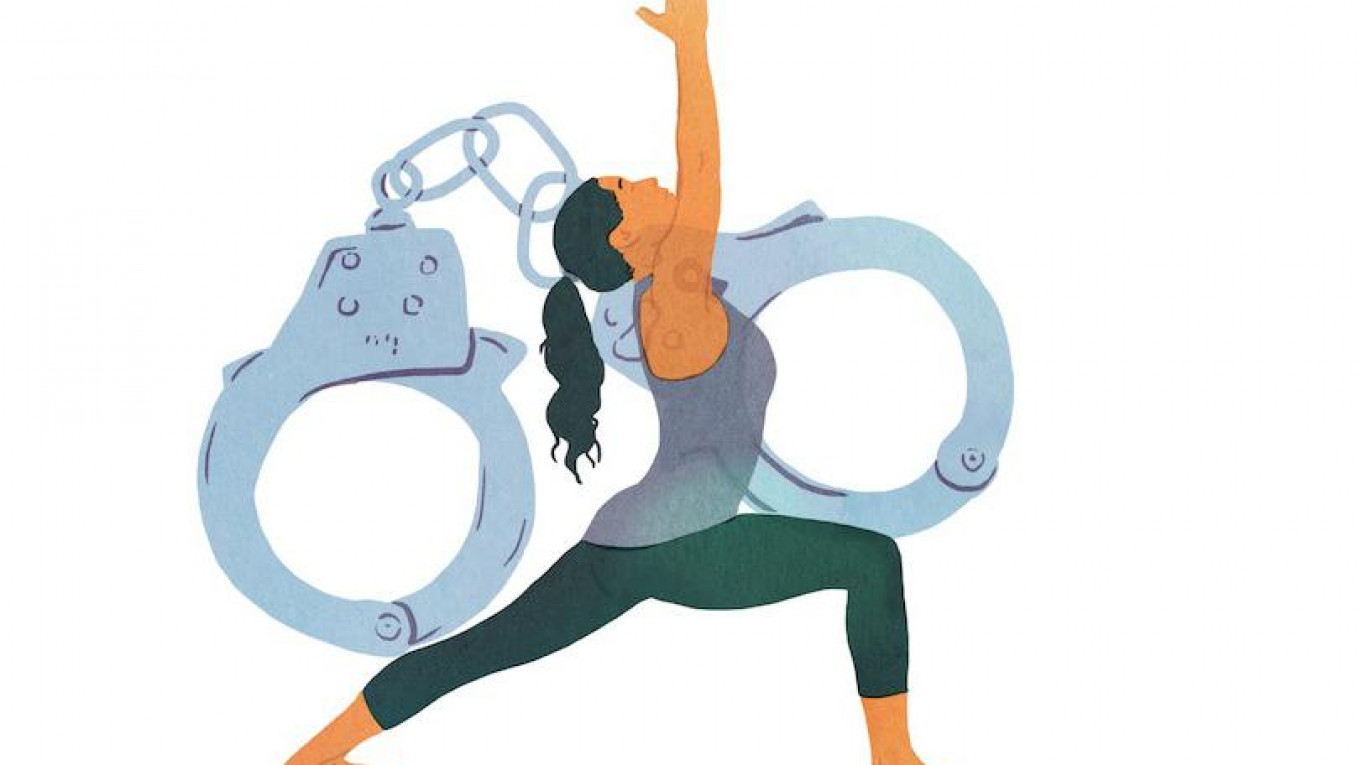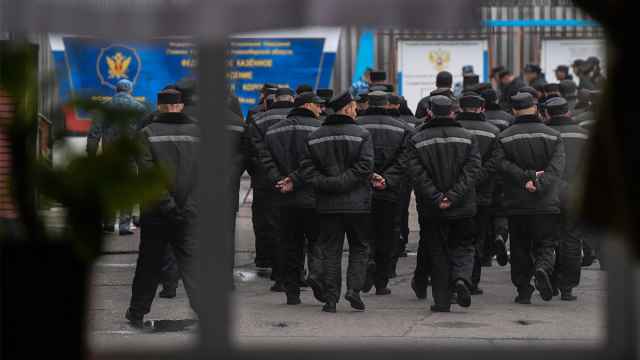Dmitry Ugai was still sitting in the lotus position when he was told to end his lecture on the spiritual roots of yoga.
By then, he had already told the audience that the Indian practice was “more than a series of interesting exercises.” And that yoga was rooted in religion.
As he rounded off his speech, a group of five men — one of whom was dressed in a police uniform — waited on the sidelines. They stood out from the colorful crowd of people who had congregated to hear Ugai speak at the Vedalife spiritual festival in St. Petersburg held in late October. “They were clearly not listening, just waiting,” recounts Ugai’s lawyer, Sergei Latyshevsky, who was at the lecture. Ugai finished his talk only to face a chain of “countless procedural violations,” Latyshevsky says.
The men escorted Ugai from the building and hauled him off to a nearby police station where they took away his phone and held him without an explanation for several hours. Then, he was told to sign a blank confession, Ugai told The Moscow Times. He refused, sparking the interrogator to ask: “Are you a moron?”
“Call me what you want," was Ugai's stoic response, according to his own account of the conversation.
Ugai has been charged with illegal missionary activity and on Jan. 18, a St. Petersburg court will review the case. An earlier hearing was postponed when the police officer who had supposedly drawn up the report said he did not recognize his signature on the paperwork.
If he is found guilty, Ugai could receive a fine of up to 50,000 rubles ($830). The sum is more than the average Russian’s monthly wage but one that the lecturer, who also works as a web programmer, can presumably afford. To many, however, the case is a matter of principle, not money. They argue that Ugai’s detention and the very fact that the case will go before a judge already present an encroachment on freedoms of religion and speech.
But experts warn it may be a taste of things to come as the so-called Yarovaya laws, which were passed last year, are starting to be implemented on the ground.
At the time, the far-reaching amendments, which include the regulation of religious activity, were framed as counterterrorism measures aimed at jihadists. But critics say that so far they have mostly been used to mount pressure on minority groups that do not adhere to one of the four recognized faiths in Russia — Orthodox Christianity, Judaism, Islam and Buddhism.
The legislation especially discriminates against “new faiths” by labeling them cults and criminalizing their activity, says religious scholar Yekaterina Elbakyan.
“These are groups that don’t have a long historical tradition, like Jehova’s Witnesses and Hare Krishna adherents,” Elbakyan says. “How else would they make themselves known other than through missionary activity? That is how Christianity spread initially as well!”
The case against Ugai, who has ties to a Krishna group, was initiated by a Russian man who said he had "lost" his wife and mother to the same group. “I have nothing against yoga,” the man told the Rosbalt news agency. “I just want people to stick to the law."
But Ugai says that is precisely what he did. He maintains he was speaking at the event in a private capacity, not on behalf of any organization. He also made sure his lecture stayed within
the bounds of the Yarovaya laws, and even consulted his lawyer
beforehand. “I warned the organizers of the festival that my talk was
going to be only popular science,” he says. “It was purely educational.”
While his personal beliefs might have put him in the
crosshairs of the authorities, the case against him rests solely on the content of his
lecture — begging the question of what exactly he did wrong.
The confusion around the case is not surprising, says Alexander Verkhovsky, who heads the SOVA Center think-tank. The vague phrasing of the Yarovaya laws, he says, encourage their expedient application by lower-rank law enforcement officials on the ground.
“[These laws] are so badly formulated,” Verkhovsky told The Moscow Times, “that any person who publicly engages or talks about a non-registered faith, can find themselves in a situation where they are branded as engaging in missionary activity.”
Ugai wasn’t first to fall victim to the law. Last month a court in Vladivostok ordered the Salvation Army to destroy 40 copies of the Bible because they had been “incorrectly labeled.” But Ugai’s case has broadened the circle of potential suspects to hundreds of thousands of ordinary Russians who do yoga or dabble in Eastern spirituality.
“If I can be charged for this then that would also apply to any academic who speaks about Eastern philosophies, anyone who practices yoga, practices Ayurvedic medicine, or does Indian dance. It’s completely absurd!” Ugai says.
Religious scholar Elbakyan cites yoga's not-so-distant past as an example of where that could lead. “In the Soviet Union, even doing simple yoga exercises without any spiritual component was a dangerous activity to undertake,” she remembers. “It was seen as alien to the Soviet man, and too different from the state’s ‘production gymnastics.’”
Times have changed, however, and Russian yoga fans are not going to surrender quietly, with Ugai's case firing up a group of people less associated with politics. “Politics and religion are two scary and unintelligible areas for me,” Sati Kazanova, a celebrity singer and socialite, wrote on Instagram. “I never thought I would want to get involved in that. But I won’t tolerate an incursion on yoga.”
In the last decade, yoga’s popularity in Russia has boomed. “It’s become one of the most popular fitness activities and a huge market,” says Sergei Baranov, a yoga instructor at a prominent St. Petersburg gym chain.
With physical activity traditionally a matter of state policy, even the Kremlin appears to have been gripped by the hype. The wife of Russia’s first president, Boris Yeltsin, sang its praises in a yoga journal several years ago and Prime Minister Dmitry Medvedev proclaimed himself an ardent fan back in 2007. But the Kremlin’s decisive blessing appears to have been given by Vladimir Putin himself during a 2015 meeting with Indian Prime Minister Narendra Modi. “Yoga cannot fail to attract,” Putin said at the time.
Nevertheless, yoga is still not an official discipline in Russia, which has led to “misunderstandings among those who are less informed about what yoga is and its different components,” says instructor Baranov.
Two yoga studios in the central Russian city of Nizhnevartovsk received requests last June to cancel classes “in order to prevent the spread of new religious cults and movements.” Although these requests issued by regional officials were later retracted, the Yarovaya “missionary” clause appears to lend future crackdowns with a legal basis.
"Ugai's case is a horrible tragedy of Russia's legal system," says Sergei Repin, the head of the Russian Yoga Federation. But his attitude is mostly defiant. A broader crackdown on yoga would mark the "beginning of the demise" of the current authorities, he said.
“Yoga has existed for 2,000 years," he told The Moscow Times. "And it will continue to do so — no matter what laws."
A Message from The Moscow Times:
Dear readers,
We are facing unprecedented challenges. Russia's Prosecutor General's Office has designated The Moscow Times as an "undesirable" organization, criminalizing our work and putting our staff at risk of prosecution. This follows our earlier unjust labeling as a "foreign agent."
These actions are direct attempts to silence independent journalism in Russia. The authorities claim our work "discredits the decisions of the Russian leadership." We see things differently: we strive to provide accurate, unbiased reporting on Russia.
We, the journalists of The Moscow Times, refuse to be silenced. But to continue our work, we need your help.
Your support, no matter how small, makes a world of difference. If you can, please support us monthly starting from just $2. It's quick to set up, and every contribution makes a significant impact.
By supporting The Moscow Times, you're defending open, independent journalism in the face of repression. Thank you for standing with us.
Remind me later.






